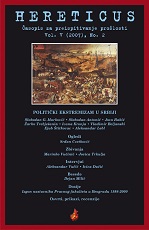Antisemitizam u Srbiji
Anti-Semitism in Serbia
Author(s): Aleksandar LeblSubject(s): Social Sciences
Published by: Centar za unapređivanje pravnih studija
Keywords: anti-Semitism; religious anti-Semitism; Jews; Serbian Orthodox Church; Serbia
Summary/Abstract: The author emphasises the fact that almost all extremist parties, organisations and movements are at the same time anti-Semitic. Religious anti-Semitism is the strongest and most frequently it is the basis of all other forms of anti-Semitism. Christian dogmas on Jews as killers of Jesus were rejected by the Catholic Church in the middle of the 1990s, while they are still in force in the Orthodox Church. Since the text deals with anti-Semitism in Serbia, the author gives an overview of the status of Jews in Serbia throughout history as well as the chronology and forms of anti-Semitism. Between the two world wars the most prominent proponents of anti-Semitism in Serbia were the following: the religious movement of Nikolaj Velimirovic, the movement "Zbor" of Dimitrije Ljotic, the tabloids and the journal Vreme before the Second World War. In 1940 the Government Cvetkovic-Macek adopted two anti-Semitic regulations. After the Second World War when the communist came into power and introduced national and religious equality, anti-Semitism was terminated. Unfortunately, in 1980s the anti-Semitism started to emerge again primarily by the emergence of the Protocol of Zion wise men and following that by the formation of different chauvinist and racial organisations which do not encounter a strong reaction from the democratic government. In certain journalist texts and books Serbs are presented as the victims of a Jewish conspiracy. The author reproaches the non-inclusion of "negation of Holocaust, gas chambers, glorification of Hitler" etc as a criminal offence in the Criminal Code of Serbia.
Journal: HERETICUS - Časopis za preispitivanje prošlosti
- Issue Year: 2007
- Issue No: 2
- Page Range: 98-104
- Page Count: 7
- Language: Serbian

